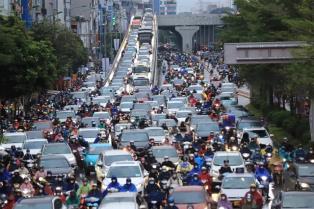Domestic automakers must manufacture autos under the Vietnamese brand name, Deputy Prime Minister Trinh Dinh Dung suggested.

Domestic automakers must manufacture autos under the Vietnamese brand name, Deputy Prime Minister Trinh Dinh Dung suggested.
These autos must be of good quality, reasonably priced and have competitiveness in the region and the world, he added.
Speaking with representatives of ministries and auto businesses at a conference on the automobile industry’s development in Ha Noi on Wednesday, the deputy PM said the Government was encouraging local, potential and prestigious businesses to co-operate with strategic partners in the world to study, manufacture and assemble autos with Vietnamese brand name.
As for the support industry, Dung said it would not only meet the domestic market but also be competitive enough to take part in the global automobile manufacturing chain. For doing so, it must access and apply advanced technologies in the world.
The industry will expand several automobile industrial complexes and centres by re-organising and re-arranging production; strengthening co-operation among automakers, assemblers and part suppliers, in addition to setting up vocational training centres, and conducting research and application to improve the investment efficiency and specialisation.
To achieve the targets, Dung suggested that auto businesses and Vietnam Automobile Manufacturers’ Association must restructure the automobile industry to identify key products that would suit the country’s development trend, as well as the market demand.
Each automaker should invest in advanced manufacturing technologies, raise the capacity of management and trade to cut costs, reduce production price, increase capacity, quality and the competitiveness of the products.
The automakers, assemblers and part suppliers must take initiative, in co-operation with potential foreign partners, to expand manufacturing, as well as to develop the network of auto support industry that would meet international standards.
The deputy PM requested the MoIT to co-ordinate with relevant sectors and ministries to supplement and complete the legal corridor, create an impartially-competitive environment for domestic automakers and importers, and meet the market principles to match with the country’s international commitments.
It must define strategic partners in the automobile and support industries; encourage businesses to increase added value in auto manufacturing, especially of products carrying the country’s brand name; strengthen management and solve trade frauds in auto imports.
The import tax on auto parts and components must also be adjusted.
Dung has assigned the finance ministry to collaborate with relevant ministries to check and adjust import duties on auto parts and components, which would be in line with the Government’s orientation and international commitments.
The ministries will study and propose preferential policies on taxes, fees and credit, ensuring the harmonisation of interests of people, the State and businesses. They need to strengthen the management of certificate of origin of complete built-up units, as per import types, which have surged in the recent time.
The transport ministry will check and fulfil the regulations relevant to quality, safety and technologies, in addition to environment protection in manufacturing and assembling vehicles, reform administration procedures, simplify registration procedures for locally-assembled autos and create favourable conditions for businesses, ensuring high standards, while protecting the rights and interests of consumers.
Meanwhile, the planning and investment ministry will work with other ministries to study and propose preferential policies to attract large-scale investment projects to Viet Nam, and encourage the development of products carrying Vietnamese brand names and other products suited to the customers’ preferences to increase export of autos to other countries of the ASEAN. — VNS





